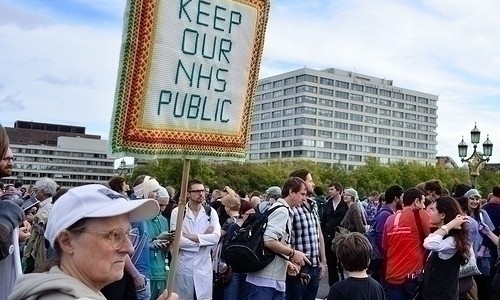La legge sulla Sanità e le Cure Sociali (HSC – healt and social care bill) è stata approvata il 27 Marzo 2012. In modo cruciale e incredibilmente serio, essa rimuove l’obbligo del Governo Inglese di fornire un’ assistenza sanitaria universalistica in Inghilterra, che fondamentalmente equivale all’abolizione dell’NHS (National Health Service = Servizio Sanitario Nazionale).
Lo afferma il Dr. Jacky Davis, co-presidente dell’Associazione Consulenti del NHS: “Dopo il passaggio del non voluto, non necessario e profondamente non democratico progetto di legge sull’NHS, non abbiamo più un Servizio Sanitario Nazionale.”
Ci fu una schiacciante opposizione dei medici professionali – ad esempio, dell’Associazione dei medici britannici e di tutti meno uno dei 26 “Royal Medical College”.Questo non venne però comunicato dai più importanti giornali e dalle reti televisive, in particolare dalla BBC.Benché con la NHS si colpisca ogni uomo, donna, bambino in Inghilterra, molti sono rimasti all’oscuro di quello che stava succedendo.
Il governo ha avuto un grande ruolo occultando ripetutamente le intenzioni della legge: rendere possibile il graduale smantellamento del NHS e la sua sostituzione, in alcuni anni, con un sistema di mercato basato sull’abilità di pagare piuttosto che sul bisogno. Secondo Michael Portillo: ”il partito dei Tories non riteneva possibile vincere le elezioni se avesse detto quello che stavano facendo (all’NHS)”.
Il governo ha anche usato informazioni false e imprecise per giustificare le sue riforme. Secondo Portillo i Tories dovevano fare qualcosa contro ”l’incredibile inefficienza” del NHS. La verità è che la NHS è uno dei Sistemi Sanitari più onesti, efficienti, corretti nelle spese, del mondo. La spesa pro-capite è la metà del Sistema Sanitario degli Stati Uniti – che non è universalistico – mentre consegue una più alta aspettativa di vita ed una più bassa mortalità infantile (dati dell’OECD – Organisation for Economic Co-operation and Development).
Il governo ha persino contravvenuto alla “legge di libera informazione” nel rendere pubblica la relazione sul rischio della proposta di legge, a dispetto del verdetto della commissione sull’ “eccezionale interesse pubblico”. E c’era un enorme conflitto d’interessi, con ¼ dei MP (Membri del Parlamento) e dei rappresentanti della camera dei Lords che hanno votato la legge pur avendo una partecipazione finanziaria nelle compagnie sanitarie private che avrebbero avuto parecchi benefici dal passaggio della proposta di legge. “Care UK”, una compagnia di assistenza sanitaria privata, ha donato una significativa somma di denaro a Andrew Lansley, segretario di stato per la salute (del Governo del Conservatore David Cameron).
In aggiunta, per rimuovere il diritto universale alla sanità pubblica, che esiste fin dal 1948, la proposta di legge HSC apre anche le porte a “spese” senza limite per i servizi NHS. Permette ai procacciatori dell’assistenza privata di prendere in mano ogni servizio del NHS . E permette che il 49% della gestione degli ospedali sia privatizzata. Oltre al fatto che l’intenzione è quasi certamente di aumentare eventualmente la percentuale al 100%- per esempio – creare un sistema “USA style” a base assicurativa- questo creerà un sistema sanitario con due vie: una per i poveri e una per i ricchi.
In un sistema a corto di denaro, una persona ricca con un problema di salute minore verrà curata prima di una persona povera con un problema di salute più severo. “L’assistenza non sarà mai più legata al bisogno ma alla capacità di pagare” dice Dr. Clare Gerada presidente del Royal College dei GPs.
Nella sua valutazione del rischio la UK Faculty of Public Health (del Royal College of Phisicians of UK) mette in guardia su: 1) Perdita di un servizio sanitario comprensivo, 2) Crescita dei costi, 3) Riduzione della qualità delle cure, 4)Aumento smisurato di disuguaglianza nelle cure sanitarie.
In breve: la NHS è integrata, comprensiva, economicamente conveniente, responsabile. Un misto di fornitori privati del servizio è frammentario, non responsabile, caro, offre solo servizi redditizi.
“Integrato” significa che i dati sono condivisi – cosa che non è accaduto con le compagnie private coinvolte nel recente allarme sull’impianto al seno – e che i pazienti ricevono cure da un gruppo multi-disciplinare di medici, infermieri, fisiatri, infermieri del distretto e così via.
“Comprensivo” significa che tutte le persone e tutte le malattie sono trattate.
“Responsabile” significa che i problemi vengono resi pubblici e non tenuti segreti da contratti commerciali.
Ma i rischi sottolineati dall’UK Faculty of Public Health sono tutte valutazioni di breve periodo. La NHS sta per essere rimossa gradualmente – nessun governo si sarebbe permesso di rimuoverla in una volta sola se, nelle ultime elezioni, non avesse ottenuto il più alto consenso pubblico mai visto. Comunque, il risultato finale, sarà un sistema sanitario basato sull’assicurazione privata come in US dove, senza assicurazione sanitaria, né tu né la tua famiglia non sarete più in grado di accedere alle cure. Il termine NHS perderà di significato. “La NHS sarà ridotta a un simbolo (logo), una somma di denaro (budget) e un qangos ( quangos – acronimo di associazioni non governative quasi autonome, cioè un tipo di impresa privata finanziata con fondi governativi)” dice il fisiatra della pubblica sanità, Dr. Alex Scott-Samuel.
Molte persone rimangono all’oscuro su cosa fa realmente la proposta di legge sulla HSC perché i maggiori mezzi di informazione non ne parlano. Come molto spesso è stato detto su Twitter, se la BBC avesse occultato le notizie sull’economia come fa con la sanità, nessuno sarebbe a conoscenza che c’è stata una crisi finanziaria globale. Nel giorno in cui la legge fu approvata, le notizie sottotitolate che scorrono durante il telegiornale della BBC dicevano:” La proposta di legge che da più potere ai GP (medici di base) è passata”. Sarebbe stato difficile trovare un solo GP che fosse d’accordo su questo.
In un periodo di severe pressioni finanziarie, un’enorme somma di denaro – stimata superiore ai 3 miliardi di sterline – è stata destinata dalle cure ai pazienti al finanziamento della riorganizzare necessaria a permettere il funzionamento della legge sull’HSC.
L’entrata in vigore della HSC Act ha creato un enorme quantità di duplicati burocratici – (che sono) la principale causa dell’elevato costo del sistema sanitario degli Stati Uniti.
Gradualmente il Governo sta deliberatamente affamando (per mancanza di fondi) la NHS. Appena gli ospedali finiscono i fondi – gli esorbitanti rimborsi a seguito degli accordi con le PFI (iniziative finanziarie private) ne sono la principale causa- diventano “prede” da essere assorbite dalle compagnie private. Questo è già accaduto con la Serco che ha preso in gestione dell’Ospedale di Newmarket.
In questo modo a una compagnia privata non solo è permesso di scegliere i servizi più fruttuosi ma, infine anche di ottenere le infrastrutture pagate dai contribuenti. E questo gli consente anche un accesso preferenziale a strumentazioni come macchine per dialisi, per il sangue e gli organi che erano state appositamente donate dalla popolazione al NHS per essere usate a beneficio di ognuno.
Il servizio NHS deve essere tenuto fuori dal commercio. Il principale interesse su cui le multinazionali stanno puntando è quello di vincere gli appalti pubblici (governativi), visto che hanno esperienza, molte risorse ed esperienza legale per farlo. Le piccole imprese e i GP locali non possono competere con loro nell’offrire i servizi, come è già stato visto accadere quando la Virgin ha sostituito il servizio civile in Surrey ( area geografica a sud est dell’Inghilterra) ed i servizi pediatrici in Devon (è un’ area del sud ovest dell’Inghilterra confinante con la Cornovaglia). Quando le compagnie private falliscono, come la compagnia con il contratto per i servizi dei medici di base (GP) a Camden, Londra, i pazienti restano a secco (senza nulla!).
Il definanziamento del NHS forza il ritmo della sua svendita a compagnie private e sta determinando l’imminente chiusura di quattro pronti soccorsi su nove che servono il Nord-Ovest di Londra. Sta forzando la chiusura del il reparto di emergenza e l’unità di maternità dell’ospedale di Lewisham, a dispetto del fatto che sono centri d’eccellenza altamente rinomati.
Le compagnie si stanno unendo in un cartello per obbligare l’abbassamento dello stipendio degli infermieri, sebbene gli infermieri stiano subendo il blocco degli stipendi ormai da molti anni. Il Dr. Peter Carter, presidente del Reale Collegio degli Infermieri (Royal College of Nurse) prevede una perdita di 56,058 posti lavoro per infermieri.
Da ultimo la frammentazione del NHS sta riducendo la condivisione dei dati. Questo significa che diventa più difficile valutare il peggioramento del sistema sanitario.
La distruzione del NHS da parte di Cameron è indiscutibilmente il peggior crimine commesso da un Governo Inglese contro la propria popolazione da generazioni. Cameron sta smantellando un’istituzione molto amata e preziosa mentre nega, mentendo, che questo sta accadendo. E lo sta facendo nello stesso momento in cui Baraka Obama, in America, sta portando il suo paese da un disastroso sistema sanitario “mercato” a un sistema sanitario universalistico, simile al NHS. Cameron sta facendo questo senza alcun mandato e lo sta facendo dopo aver intenzionalmente nascosto la sua politica sanitaria già prima delle elezioni del 2010. La NHS rappresenta quanto di più prezioso la popolazione britannica possegga. E’ parte integrale della nostra cultura e, come Danny Boyle dimostrò nelle Olimpiadi del 2012, definisce l’Inghilterra, simbolizza l’imparzialità e il lavorare uniti per il bene comune.
The great NHS robbery
Marcus Chown 31 January 2013
Award winning author, Marcus Chown, summarises the reality of what has happened to the NHS, the quality of press coverage and why it is so important the public understand the truth beneath the packaging.
About the author
Marcus Chown is an award-winning writer and broadcaster, and author of a number of books, including We Need to talk About Kelvin, Quantum Theory Cannot Hurt You and Solar System for iPad. His wife is a Macmillan nurse.
NHS – becoming a logo for private providers? Image: Graham Smith
The Health and Social Care was passed 27 March 2012. Crucially and most seriously, it removes the UK government’s obligation to provide universal healthcare in England, something so fundamental it amounts to the abolition of the NHS. As Dr Jacky Davis, co-chair of the NHS Consultants Association says: “After the passage of the unwanted, unneeded and deeply undemocratic NHS bill, we no longer have a national health service.”
There was overwhelming opposition from the medical profession – for instance, from the British Medical Association and all but one of the 26 royal medical colleges. This was not communicated by the mainstream media, particularly the BBC. Although the NHS affects every man, woman and child in England, most remain in the dark about what has happened.
The government has played a big role by repeatedly concealed the purpose of the bill – to make possible the gradual dismantling of the NHS and its replacement in a few years by a market system, based on ability to pay rather than need. According to Michael Portillo: the Tories did not believe they could win an election if they told you what they were going to do [to the NHS]”.
The government also used mis-information to justify its reforms. According to Portillo, the Tories had to do something about the “incredible inefficiency” of the NHS. The truth is the NHS is one of the fairest, most efficient and cost-effective healthcare systems in the world. It has half the per capita costs of the US health system – which is not universal – and has a higher life expectancy and lower infant mortality (OECD figures).
The government even defied a Freedom of Information act ruling to make public the risk assessment of the bill, despite the commissioner’s verdict of “exceptional public interest”. And there was a massive conflict of interest, with 1/4 of the MPs and Lords who voted for the Bill having financial stakes in private health companies that stood to benefit by from the bill’s passage. “Care UK”, a private health company donated significant money to the office of health secretary Andrew Lansley.
In addition to removing the universal right to healthcare, which has existed since 1948, the HSC Act also opens the door for charges without limit for NHS services. It permits private providers to take over any NHS services. And it allows up to 49% of the business of NHS hospitals to be private. Quite apart from the fact that the intention is almost certainly to eventually increase this percentage to 100% – ie: create a US-style insurance-based system – this will create a health system with two queues: one for the poor and one for the rich. In a cash-strapped system, a rich person with a minor ailment will be treated over a poor person with a more serious ailment. “Care will never again be according to need but ability to pay,” says Dr Clare Gerada, Chair of the Royal College of GPs.
The Faculty of Public Health’s risk assessment warns of 1) Loss of a comprehensive Health service, 2) Increased costs, 3) Reduced quality of care, 4) Widening health inequalities. In a nutshell: the NHS is integrated, comprehensive, cost-effective, accountable. A mix of providers is fragmented, unaccountable, expensive, only profitable services.” ‘Integrated’ means that data is shared – something which was not the case with the private companies involved with the recent breast implant scare – and that patients receive care from a multi-disciplinary team of doctors, nurses, physios, district nurses, and so on. ‘Comprehensive’ means that all people and all ailments are treated. ‘Accountable’ means that problems are made public and not concealed by commercial contracts.
But the risks highlighted by the Faculty of Public Health are all short term. The NHS is being removed gradually – no government would dare remove it in one go since, at the last election, it had the highest-ever public approval rating. However, the end-game is an insurance-based system like the US where, without health insurance, you will not be able to get treatment for you and your family. The term NHS will be meaningless. “The NHS will be reduced to a logo, a budget and a few qangos,” says public health physician, Dr Alex Scott-Samuel.
Most people remain in the dark about what the HSC Act does because of failure of the mainstream media. As has often been said on Twitter, if the BBC covered economics like it has health, nobody would know there had been a global financial crisis. On the day the Act was passed the strap-line across the bottom of BBC News broadcasts said “Bill which gives power to GPs is passed”. It would be difficult to find a GP who agreed with that.
At a time of severe financial pressure, huge sums of money – estimated at more than £3 billion – are being diverted from patient care to fund the reorganisation necessary to implement the HSC Act.
The implementation of the HSC Act is creating huge amounts of duplicated bureaucracy – the principle cause of the high cost of the US healthcare system.
Gradually, the government is starving the NHS of money. This is deliberate. As hospitals run out of money – and the exorbitant repayments on PFI deals are a major factor here – they become prey to takeovers by private companies. This has already happened, with Serco taking over Newmarket Hospital.
Not only does a private company cherry-pick profitable services but it gains infrastructure paid for by the taxpayer. It can also give preferential access to equipment such as kidney machines, blood and organs that were specifically donated by the public to the NHS for use by everyone.
NHS services must be put out to tender. The core business of the transnational corporations that are bidding is winning government contracts, as they have the experience, deep pockets and legal expertise to do so. Small enterprises and local GPs cannot compete with them in tendering for services as has already been seen in the Virgin takeover of community services in Surrey and children’s’ services in Devon. When private companies fail, such as the company with the contract for GP services in Camden, London, patients are high and dry.
The starving of the NHS of money to force the pace of its sell off to private companies is forcing the imminent closure of 4 out of 9 A&E departments serving NW London. It is forcing the closure of Lewisham Hospital A&E and maternity unit, despite the fact that they are highly rated as centres of excellence.
Trusts are getting together in cartels to force down nurses’ pay, though nurses have experienced a pay freeze (ie: pay decrease, taking into account inflation) for several years now. Dr Peter Carter, Chair of the Royal College of Nurses is predicting the loss of 56,058 nursing jobs.
Lastly, the fragmentation of the NHS is reducing data sharing. This means it is even becoming more difficult to assess just how healthcare is worsening.
Cameron’s destruction of the NHS is arguably the worst crime committed by a UK government against its people in generations. He is dismantling a much-loved and precious institution while lying that he is not. And he is doing at a time when Barrack Obama in the US is moving his country from a disastrous market-based health system to a universal system of healthcare similar to the NHS. Cameron is doing it with no mandate and he is doing having concealed his health policy prior to the 2010 election. The NHS represent everything the British people hold dear. It is integral our culture and, as Danny Boyle demonstrated at the 2012 Olympics, defines Britain, symbolising fairness and working together for a common good.
Da Open-Democracy, di Marcus Chown, 2013
- © Riproduzione possibile DIETRO ESPLICITO CONSENSO della REDAZIONE di CONTROPIANO
Ultima modifica: stampa




